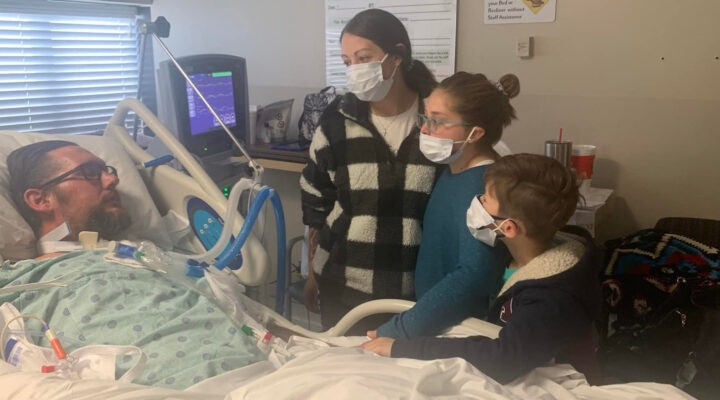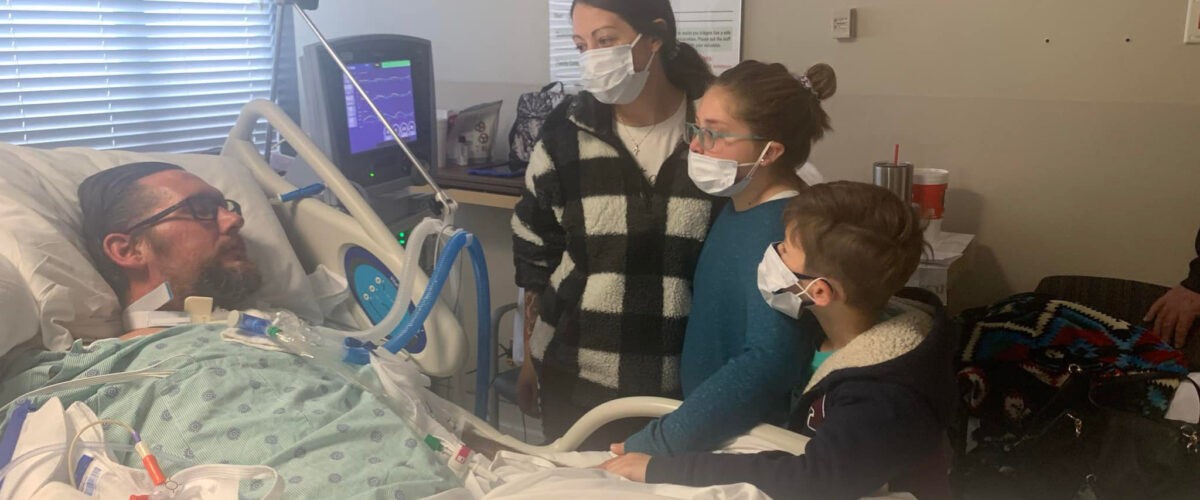Amid the millions of stories of devasting loss from COVID-19, occasionally there’s an unexplained miracle. This is one such story.
Chase Martin is a 34-year-old former college linebacker who lives in Moore, Okla., a southern suburb of Oklahoma City. In early August 2021 through mid-September, his immediate family and extended family all came down with COVID. Most of them experienced relatively mild symptoms because they were vaccinated.
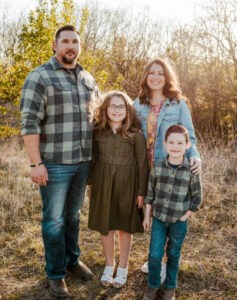
Chase and his family before COVID.
Chase, the only member of the family not vaccinated, had a vastly different experience. Although young and healthy, he carried a significant risk factor because he’s Cherokee. Native Americans are 3.5 times more likely to be hospitalized with the virus than the general population.
His wife, who is a home health care nurse, and his mother, who is a school librarian, both contracted the virus and missed days of work but recovered. “The only person in our family I could not talk into getting the vaccine is our son,” said his mother, Theresa Peak Mosier. “He had a huge fear. It didn’t matter how we came at it. I finally had to let it go.”
While other family members recovered, Chase got worse. “Within a week his oxygen levels were dipping into the 80s, so Alex (Chase’s wife) immediately took him to Southwest Medical in Oklahoma City,” Theresa recalled. There, Alex just had to drop off her sick husband at the Emergency Department where she was not allowed to go in — a scene played out at hospitals around the world.
That was Sept. 16. Ten days later, the hospital called to say Chase needed to be intubated and placed in a medically induced coma — a state he would remain in for weeks.
Medical researchers have documented that when a COVID patient is placed on a ventilator to assist with breathing, the odds of them surviving are less than half. The reported mortality rate for intubated COVID patients ranges from 50% to 65%.
Chase was well on his way to becoming one of those statistics.
It was a Saturday when the hospital called again to ask Chase’s family to come to the hospital to say their goodbyes. He had experienced a cytokine storm, which is a cascade of exaggerated immune responses that typically lead to death in COVID patients.
Miraculously, the hospital allowed the family to come visit in-person that day.
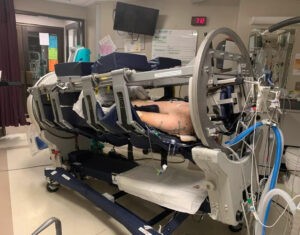
Chase in the RotoProne bed in ICU.
“The whole family went up there,” Theresa explained. “When I walked into the ICU, I really thought I was going to drop to the floor. He was on a RotoProne bed. I’d never seen anything like that before. The bed was doing the moving for him. Just stepping in and seeing that blew me away, I couldn’t even find his head.”
Again, miraculously, Chase didn’t die that day. But he would lay in that rotating bed until the second week of November.
What made him survive when others around him were dying every day is unknown. His mother believes part of the answer is intensive prayer and the fact that the hospital from that day forward allowed family members to stay by his side.
“I really think us being there was a huge factor in him making it,” she said. “Everything from the moment we stepped in there changed. We had probably 40 people in that ICU waiting room to talk to him. His numbers immediately started changing. His brain activity, you could see it jump up when we would say certain things like, ‘I love you, Chase. It’s mom.’ It all changed on the activity monitor.”
Again miraculously, the hospital staff let family members not only visit Chase but to hold vigil by his bedside. “We never left his side from that day forward,” Theresa said. “Somebody stayed with him 24/7. We were tag teaming it.”
Even so, Chase’s progress was up and down. “The hardest part during that time was the back and forth,” his mother explained. “He would make progress and we’d get so excited, and then the weirdest things would happen. I never could imagine what all it takes for your body to stay alive.”
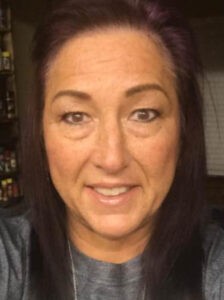
Theresa Peak Mosier
Being present full-time with a COVID patient also allowed the family to see something most other families don’t get to see — the intense dedication and skill of the hospital staff.
“Those ICU people are amazing,” Theresa said. “The level of knowledge those nurses have is unbelievable. They worked around the clock. They gave it everything they’ve got.”
And the family daily witnessed the toll of COVID on other patients. “There wasn’t anybody in that ICU who didn’t have COVID,” Theresa recalled. “It was filled with COVID.
“There were more nights when somebody passed away than there were nights when nothing happened. They would have a new patient in that room within an hour. If the world only knew what was going on every single day in this unit, there’s no way we could be at the point we’re at right now. I don’t think the world even realizes what’s going on and how hard those people are working to save people.”
Witnessing this daily ritual of death caused Chase’s family to marvel even more at his slow survival. “We have no idea what the turning point was except for prayer and the fact that his family never left his side, and they didn’t make us,” his mother said.
The medical staff first attempted to bring Chase out of his induced coma in mid-October, but that didn’t last and due to complications, he had to be sedated again for a couple more weeks, then they tried again.
It was around Thanksgiving that family got to start speaking to him, Theresa said. “It was just amazing. There was not a dry eye in the house. He literally recognized every single person. They couldn’t tell us what kind of state he would be in, if there was any kind of damage to his brain. They told us we’ll only know once he wakes up.”
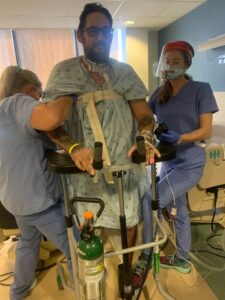
Hospital staff helping Chase learn to stand and walk again.
Initially, Chase remembered nothing of being in the hospital before he was placed on the ventilator. But he did have memories — scattered, foggy memories — of his time being sedated.
“I could hear your voices, but there’s so much I don’t know,” he told them. “There are times I remember hearing your voices and hearing music.”
His mother said they played music for him all the time, including a special song by Michael Buble’, Forever Now. Buble wrote the song to express his love for his son as a father. Its lyrics begin: “I just met you, seems like yesterday. You opened up your eyes and I recognized your face. You know that you’re the one that we’ve been waiting for; we’re going to keep you safe.”
That song, Theresa said, embodied her own feelings for her son as he lay in a hospital bed near death’s door. And somehow, the music got through to Chase’s brain, and upon awakening, he remembered hearing it.
But Chase had his own message after waking, too: “I’ve always believed in God, but he talked to me. He told me it was not my time. I talked with grandpa and grandma,” Theresa’s parents. And Chase told his mother her parents had messages for her about how proud they were of her and what a great job she was doing as a mother and a grandmother.
Theresa grew up at First Baptist Church of Moore, where her entire family was active and her father often played saxophone in worship. Today, she and her husband are Roman Catholic and attend St. Thomas More parish in nearby Norman.
Chase and his family are believers but had not been active in a church. But that’s all changing now, too.
“He woke up and he was like, ‘I’m finding a church home. My family and I, we’re finding a church home,’” Theresa said. “I didn’t really expect that out of him. But when he said, ‘I talked to God,’ I totally believe him.”
“When he said, ‘I talked to God,’ I totally believe him.”
Still, there are so many unanswered questions. Chase has spent hours trying to reflect on what has happened and how to make sense of it all. He’s home now, walking with a walker and his goal is to get back to work. When he got sick, the 6’-4” man weighed 280 pounds. Now he’s down to about 180. He wants to get vaccinated as soon as he can, although he has to wait several months due to his medical condition.
Along with his wonderment, the family also struggles to make sense of all they experienced.
“I know 100% that this is totally a God thing,” his mother said. “In my mind, it’s a miracle. There was something about my faith that would never ever let me see him not being on this earth. I couldn’t entertain that thought. And more than anything it has solidified my faith, made it even stronger. I know God was taking care of him.”
And yet, this family realizes their miracle is not the experience of so many other families.
“There are so many people we saw ourselves, would pray with families for their loved ones, and they didn’t make it,” Theresa explained. “They don’t have the ending we have right now.”
Related articles:
Evangelist dies of COVID just 25 days after preaching at a huge Baptist youth camp
Why have so few U.S. congregations experienced even a single COVID death?

